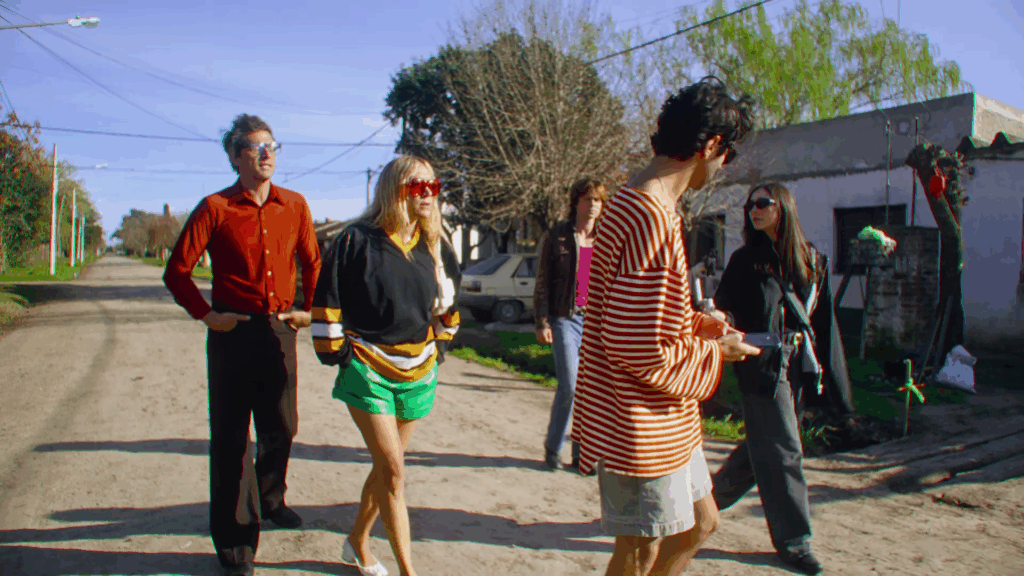Two New Films
Montreal/Paris/London/New York/Berlin/Chicago/Seoul/Amsterdam/Mexico Metropolis/Tokyo/Vancouver/Los Angeles. Within the Day-Glo gentle of the mid-aughts, that slogan of American gentle energy swung off canvas tote luggage all over the place. The message was optimistic: the world has no boundaries—a minimum of, should you’re carrying American Attire.
Magic Farm, the sophomore work of Argentine director Amalia Ulman, is that millennial dream fruited and fermented. Her characters work at a VICE-style gonzo internet present, pal round with Chloë Sevigny, and proudly blaze a path via the world, completely unaware that the path they’re proudly blazing has already been paved and advertises Monday–Friday street-side parking.
Ulman’s grifters find yourself within the Argentine countryside chasing a tip that doesn’t exist. Shortly, they resolve to manufacture one—unconcerned with the ethics behind writing their very own actuality and detached to the townspeople’s precise lives, which, in fact, have much more depth: the close by farmland is routinely crop-dusted with a pesticide that’s resulted in a sickly, cancer-addled inhabitants. The People despair over crushes, bugbites, jobs, and the imagined ache of making one thing revelatory out of nothing. Can magic be manufactured? Or does it, like factory-farmed corn, salmon, or cattle, find yourself tasteless, even cancerous?
Private childhood heartthrob Alex Wolff (passing round a enterprise card replete with the American Attire font) swings between braggadocio and romantic spoil. Instantly, he’s entranced by native soubrette Camila del Campo, a stunner who scampers up bushes to put up thirst traps. Chloë, his extra mature love curiosity, is the hostess of the present. She is paraded round by the touring circus, desperately sad with the cage she constructed. In the meantime, Joe Apollonio swoons within the presence of Guillermo Jacubowicz, the good-natured lodge proprietor, culminating in a sexually tense however doomed laundry-washing. As an actress, Ulman is essentially the most reserved of the bunch, enjoying a pregnant translator caught between the locals and the People.
As a director, Ulman is something however reserved, excelling at tender moments of private inadequacy, permitting characters to snip themselves right down to the short. She strikes the digital camera with a way of boundarylessness: the viewer is positioned on the top of the canine, is shot into the air, and takes a trip round on a bike. Unironically, boundarylessness is what killed American Attire: their CEO, Dov Charney, was finally ousted for sexual misconduct. The shops in Montreal/Paris/London/New York/Berlin/Chicago/Seoul/and many others. closed separately, after which all of a sudden. The world, in any case, shouldn’t be edgeless. Magic Farm’s hapless protagonists could also be oblivious to their environment, decided to cocoon themselves within the security of their very own issues—however, Ulman ensures, we aren’t.
—Nicolaia Rips
In The ADHD Muses, Bernadette Van-Huy—higher generally known as the eponymous member of the artwork collective Bernadette Company—takes on the “pretend theme” of ADHD. As to what makes the theme “pretend,” I’m nonplussed. Maybe it’s only a refusal to decide to an concept. The film begins with jazz, but it surely’s all downhill from there.
The check group for this satirically engaged theme—which tracks with the collective’s curiosity in pouring identities into prefabricated kinds and isn’t a horrible premise within the summary—are two younger ladies whose lack of obvious expertise isn’t allowed to get in the best way of the filmmaker’s affectionate curiosity about them. Certainly one of them, Marika Thunder, is the daughter of painter Rita Ackermann, a longtime affiliate of the filmmaker’s. A good portion of the movie is shot in what seems to be Ackermann’s studio, the place Thunder and Tessa Gourin, an aspiring actress, woodenly recite scenes from Pulp Fiction or a Christopher Walken monologue that, just like the title Annie Corridor scrawled on an in any other case clean wall, don’t make themselves any extra attention-grabbing than the typical spazzed shoutout. Uneven modifying doesn’t make the movie kinetic and even vigorous. The older, figurative painter Eric Fischl will get name-checked—I suppose he’s on the attention-deficit spectrum, as they are saying—and it’s an indication of how boring The ADHD Muses’s proceedings are that I might have welcomed an interview about his dusty work by the point the Imply Women scene recitations began.
A protracted shot of Gourin strolling alongside East Eighty-Sixth Avenue and interior-monologuing about her life up to now and an prolonged studio go to with Thunder each fail to encourage. Gourin: “A very attention-grabbing reality about me is I’m all the time early.” If there was a script for the movie, SMALL TALK! can be the header (and footer) on each web page.
The outro to the movie options an omniscient narrator providing a curious meditation on clock time, implying a thematic connection to the ladies’s private orientations, but it surely’s a little bit late to be retrospectively tacking on a protracted view that the director’s topics themselves lack. If there was a guiding idea behind the movie, possibly it ought to have felt a bit extra actual to Van-Huy earlier than she pressed RECORD.
—Paige Ok. Bradley


0 Comment